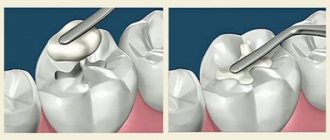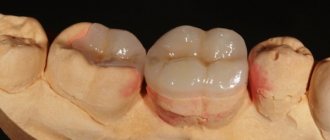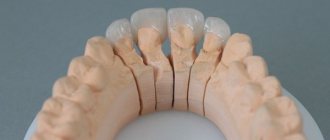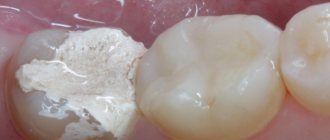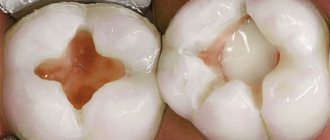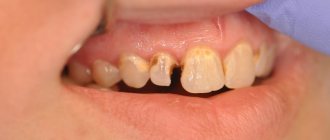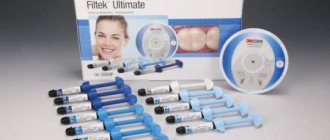Filling material Filtek Ultimate belongs to the new generation of light-curing composite materials. It is used for filling both frontal and chewing teeth.
The composite has good radiopacity, which helps to correctly determine the location of the installed filling.
To fix Filtek in a carious cavity, special adhesive systems are used. The best materials are from 3M ESPE.
A wide range of dentin and enamel shades, a large number of universal body color options allow the material to be used on any teeth. Additional aesthetics are provided with the transparent shades included in the set.
Composition and release form
The composition is based on polymer resins. They are presented in several versions:
- Bis-GMA;
- UDMA;
- TEGDMA;
- PEGDMA;
- Bis-EMA.
The color of the filling is given by the filler:
- non-aggregated silicon filler with a size of 20 nm;
- non-aggregated zirconium filler 4-11 nm;
- dispersed zirconium and silicon cluster filler.
The size of the particles will depend on the type of material itself. In enamel, dentin and body shades they will measure 0.6-10 microns.
For transparent flowers, the optimal value is 0.6-20 microns.
The composite is available in the form of a syringe weighing 4 g. They can be purchased in various sets.
Single Shade Trial Kit
The set includes 2 syringes in shades A2 and A3, 2 pieces, both Body. The kit also includes technical instructions.
Dual Shade Trial Kit
Includes 4 types of material:
- dentin shades A3 and A4;
- enamel shades A2 and A3.
Plus a scale for choosing the color of the material and technical instructions are added.
Professional set
The set consists of 12 shades:
- dentin colors A2, A3, B3;
- enamel colors A1, A2, A3 and W;
- body colors A2, A3, A3.5 and B2;
- transparent shade AT.
A scale for determining color and technical instructions have also been added.
The fourth configuration option is individual syringes.
Material properties
According to the classification, Filtek Ultimate belongs to nanocomposites. The main properties of this filling material are:
- low shrinkage after light curing;
- excellent strength;
- sufficient wear resistance;
- plastic;
- easy adaptation to carious cavity;
- good packability;
- good polishability;
- long-term preservation of surface gloss;
- "chameleon" effect.
Prices for caries treatment
| Service | Price, ₽. |
| Examination of the patient, calculation of the cost of services | for free |
| Light polymer (Light) filling Estelite | 2800 |
| Light-polymer (Light) filling Vitrimer | 2700 |
| Light polymer (Light) filling Filtek | 2500 |
| Fuji glass ionomer cement | 2200 |
| Light-polymer (Light) filling Revolution (for a crown) | 1800 |
| Treatment of average caries MOD Estelite | 4000 |
| Treatment of average caries MOD Filtek | 3800 |
| Treatment of medium caries MOD Fuji | 3500 |
| Grinding the filling | 350 |
| Temporary filling with Septopak medicinal preparations | 550 |
| Temporary filling (dentin) | 300 |
| Temporary light filling Clip | 400 |
| Fuji insulating gasket, revolutionary | 450 |
| Light polymer therapeutic pad | 450 |
| Fiberglass pin | 1600 |
| Anchor pin | 800 |
| Titanium pin | 1500 |
| Additional surface no more than one Estelite | 800 |
| Additional surface no more than one Filtek | 600 |
| Additional surface no more than one Fuji | 500 |
| Aesthetic restoration of anterior teeth according to class III | 3500 |
| Aesthetic restoration of anterior teeth according to class IV | 3800 |
| Clinical/home whitening | 6500-8500 |
When to use
This composite is recommended for use in the following cases:
- filling carious cavities on all groups of teeth;
- superstructure of the stump for future orthopedic construction;
- splinting teeth for periodontitis;
- indirect dental restoration using inlays and veneers.
Preparation for using the composite
Initially, teeth are cleaned using a brush and toothpaste, then sanitation and professional cleaning are done.
Then you need to choose the color of the future filling. For these purposes, the standard VITA scale is used. To choose the right shade, you need to follow the following recommendations:
- Since the color of the tooth is not uniform, it is divided into 3 parts, each of which has an individual shade. Restoration in the cervical area should be made of a material that has a yellow tint. The middle part is restored from grey, yellow or brown colors. The cutting edge should be made of gray or blue shades.
- The color saturation of the resulting restoration depends on the amount of material used. The smaller it is, the more transparent the filling will be. Depending on the volume of tissue that needs to be restored, the shade is selected. You can select it in that part of the scale that matches the thickness of the future filling.
- After this, part of the material is taken and applied to the place where the dental procedure will be performed. The composite is polymerized, and its shade is assessed under different light sources. You can repeat this step until an acceptable color match is achieved.
The final stage is to isolate the working area with a rubber dam or cotton rollers.
These steps must be followed regardless of the type of restoration.
Price
The cost of both sets and individual Filtek syringes varies quite widely. It depends on the configuration of the kits and the type of composite.
The average price level in Moscow looks like this:
- Set of maximum content – 22,000-29,000 rubles.
- Sets Single Shade and Dual Shade – 10,000-15,000 rubles.
- Syringes – from 2300 rub. (depending on the type).
More accurate information can be found on the seller’s website and by calling reference numbers.
From the video, learn about the new filling material Filtek Bulk Fill Posterior.
Direct recovery technique
In this case, the following procedures are carried out:
- treatment of carious cavity;
- if necessary, a therapeutic or insulating pad is applied to the bottom of the cavity;
- if it is planned to restore contacts between teeth, the doctor installs a matrix;
- etching of enamel and dentin;
- application of adhesive and its polymerization;
- the required amount of filling material is removed from the syringe and placed on a special notepad, then the syringe is closed with a cap, and the notepad is covered with protection from light;
- the introduction of the composite into the prepared cavity should occur layer by layer and in a tiled manner;
- each layer is separately illuminated using a halogen or LED lamp with a light range of 400-500 nm;
- contouring the filling with finishing stones, burs or carborundum stones;
- checking occlusion using articulation paper and correcting if necessary;
- final grinding and polishing of the filling.
Reviews
Filtek brand filling materials are used in almost every clinic. The vast majority note the complete compliance of expectations with the results obtained.
We invite readers who have experience in restoring teeth using this material to share their opinions about it in the comments to this article.
If you find an error, please select a piece of text and press Ctrl+Enter.
Tags treatment filling material Filtek fillings
Did you like the article? stay tuned
Previous article
Provocateurs of alveolar bleeding and ways to combat complications
Next article
Review of traditional and innovative gingivotomy method
Indirect restoration technique
Stages of indirect dental restoration:
- selection of shade using the method described above;
- tooth processing for the selected type of structure;
- taking an impression and sending it to the laboratory;
- production of plaster models;
- preparing a model of the processed tooth, a layer of separator is applied to it so that at the end the finished structure can be removed;
- layer-by-layer application of the composite to the tooth, formation of its anatomy, contact points and polymerization (the technique is the same as for direct restoration);
- polishing the structure and testing it on a model;
- in the clinic, the doctor checks the prosthesis in the patient’s oral cavity and, if everything is satisfactory, then fixes it; in case of defects in color, shape and size, the structure is returned to the laboratory for correction;
- creating roughness on the inner surface of the product;
- cleaning the prosthesis using a soap solution in ultrasound;
- then it is washed under running water and dried;
- Finally, the restoration is fixed with composite cement.
Preparatory activities
Working with the proposed composites requires certain preparatory work.
The first step is standard brushing of teeth using normal hygiene products. Then the dentist performs a complete sanitation of the oral cavity. It includes treatment, inflammation removal and professional cleaning.
The final stage of preparation is the correct selection of the shade of the proposed filling. It is executed in the following order:
- Dividing the tooth into segments. The body of the tooth has some heterogeneity in color tone in different areas.
To reconstruct it correctly, the entire area is divided into 3 segments. Each of them is filled with a composite that matches the color for the given area.The area near the neck of the tooth is restored with yellow material. For the middle, composites of gray, yellow or brown color are used. The upper (incisal) border is made in grayish or blue shades.
- Selection of shade. The color and its saturation of each of these areas is checked using an auxiliary color scale, corresponding to that part of it that is identical to the thickness and color of the desired area of the tooth.
- Checking the correct selection. To control the correct choice of shade, the composite is applied to the desired location.
After its polymerization, a visual assessment is made using different types of light. If necessary, adjustments are made until the desired effect is achieved. - Isolation and protection of the treated area from other teeth is carried out using a latex napkin (rubber dam). If it is not available, then the use of cotton swabs or a saliva ejector is used.
This concludes the preparatory work before the restoration of damaged surfaces begins. It must go through the full cycle, regardless of which method of tooth reconstruction is chosen.
special instructions
Syringes should be stored at room temperature with the lid tightly closed. Shelf life – 3 years. It is necessary to completely exclude exposure to light, as the material may lose its properties. Also, the composite should be kept away from products containing eugenol.
Due to the content of polymer resins, there is a possibility of developing allergies upon direct contact with the material. To reduce the risk of allergic reactions, the composite must be used with protective gloves, completely eliminating any contact.
In case of contact with skin, wash it immediately under running water. If the material ends up on the gloves, they are removed and the hands are treated with soap. Then new gloves are put on.
Filtek Z250
Filling material 3M ESPE Filtek Z250 belongs to microhybrid composites. It is also used to fill all types of cavities.
Differences in composition
The composite is also based on organic resin. Unlike the Ultimate series, only bis-GMA, UDMA and bis-EMA can be found in the composition.
In addition to the matrix, the Z250 series has a different filler. It contains particles 0.5-5 microns in size.
Release form: 4 g syringe. The number of color options is much smaller; there is no division into dentin, enamel and “body”.
Differences in properties
This material also has the basic properties of composites, namely:
- satisfactory aesthetics;
- wear resistance;
- radiopacity;
- long-term preservation of the quality of the filling.
But due to the different size of the filler, the material has some disadvantages compared to the Ultimate series:
- higher shrinkage during polymerization;
- more complex application of material and its insufficient density;
- the quality of the restoration itself is lower;
- worse polishability;
- insufficient strength when used on complex and multi-level cavities.
Indications, methods of use and precautions are similar to the previous substance.
general information
Filtek is a composite material widely used for dental restoration. It was developed by specialists from the famous ZM ESPE corporation at the beginning of this century.
For the first time, specialists used the latest technologies - the introduction of nanoparticles, nanoclusters and their combinations into the composition of the composite. This ensured the material long-term strength and exceptional aesthetics.
A large number of shades of the composite are presented, and this makes it possible to use it on any part of the dentition. At the moment, Filtek is firmly established in the arsenal of modern dentists.
Nanohybrid Z550
This type of composite belongs to nanohybrid materials.
Differences in composition
Filtek Z550 contains particles with a size of 0.5-5 microns and nanoclusters with a diameter of 0.6-10 nm. It is based on the same polymer resins as the Ultimate material.
Release form – syringe 4 g.
Differences in properties
The 550 series is a modification of the Z250 series. It differs from it in the presence of nanoparticles added to the composition, which improved some of its indicators:
- strength has become higher;
- improved wear resistance;
- insertion into the cavity has become easier and more convenient;
- modeling the filling surface has become easier.
But still, the content of miniparticles does not allow the Z550 to have the same high level of aesthetics as the Ultimate series. In addition, high shrinkage remains after polymerization of the material. The degree of polishability of the material also differs. For this composite it will be slightly lower.
Indications for use, precautions and methods of use correspond to previous photopolymers.
Bottom line
Now it has become clear to you that Filtek is a nanocomposite of versatile use, which can be used not only for teeth intended for chewing, but with its help you can also restore the front teeth.
Now you have become aware of all the advantages of this composite, and it will not be difficult for you to choose the material that suits you, both for the restoration of chewing teeth and for the aesthetic restoration of the front teeth.
Sources:
- https://www.vash-dentist.ru/lechenie/zubyi/plombyi/vozmozhnosti-materiala-filtek.html
- https://dentazone.ru/preparaty-oborudovanie/materialy/filtek.html
- https://zubovv.ru/lechenie/zubyi/plombyi/svoystva-materiala-filtek.html
- https://FB.ru/article/420332/filtek-z-obschaya-informatsiya-forma-vyipuska-sostav-naznachenie-tehnologiya-provedeniya-rabotyi-pokazanie-i-protivopokazaniya-k-primeneniyu
- https://El-dent.ru/id/filtek-ultimate-kompozit-enamel-b2e-3920b2e-3m.html
- https://medicina-top.ru/%D1%81%D0%B2%D0%B5%D1%82%D0%BE%D0%B2%D0%B0%D1%8F-%D0%BF%D0% BB%D0%BE%D0%BC%D0%B1%D0%B0-%D1%84%D0%B8%D0%BB%D1%82%D0%B5%D0%BA/
This is interesting: Tooth granuloma: treatment at home with folk remedies

